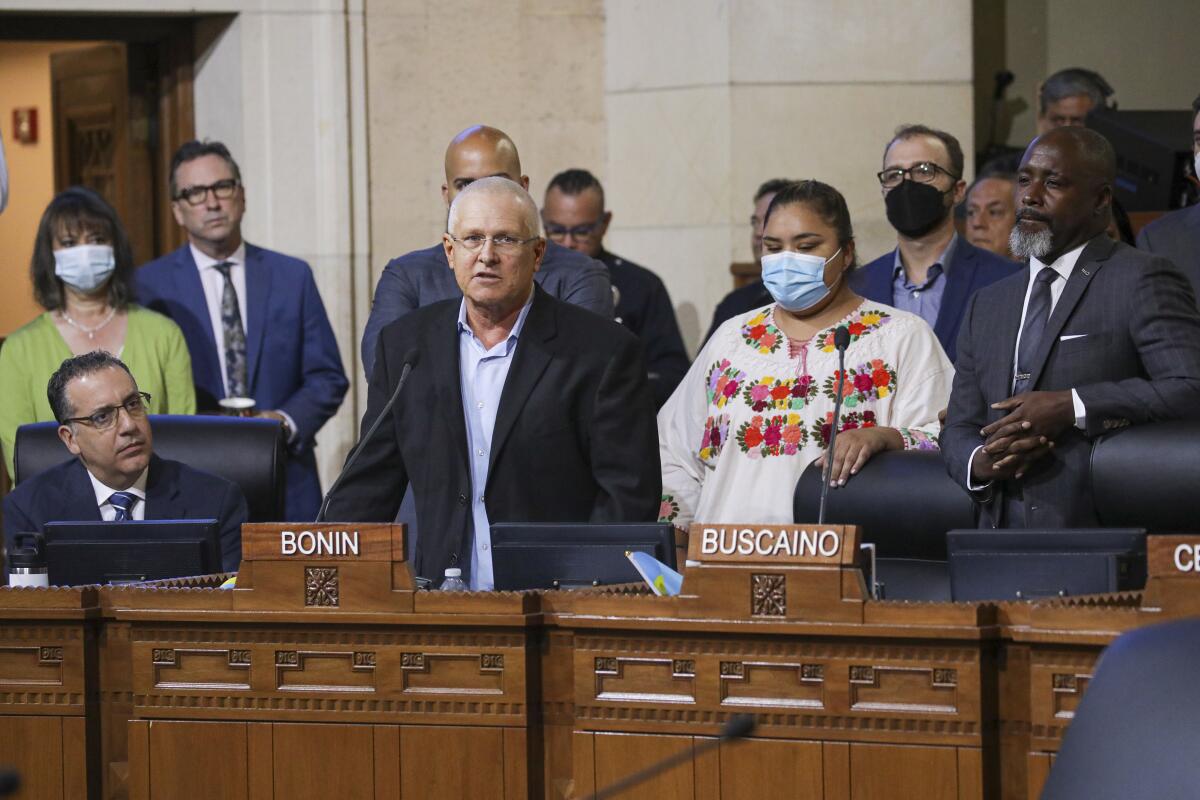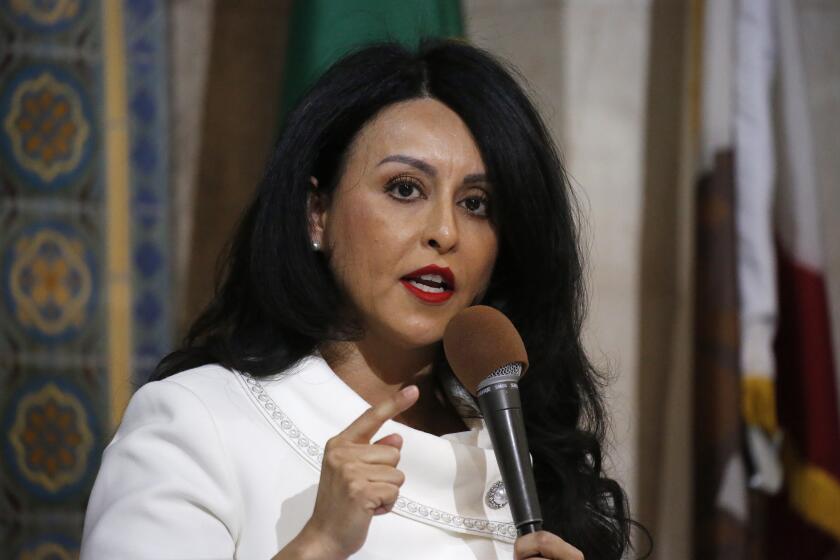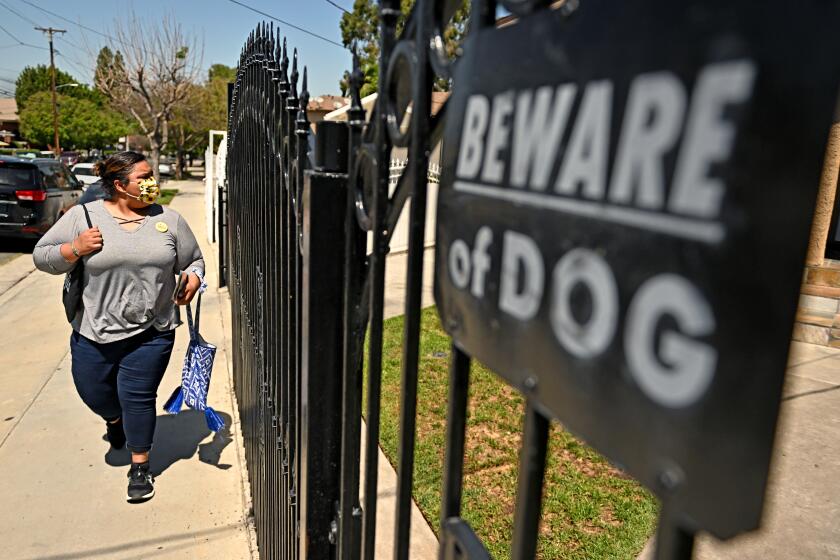Eunisses Hernandez unseated Gil Cedillo. Can she help solve L.A.’s political crisis?

- Share via
Two days after a leaked audio recording jolted Los Angeles, angry and pained citizens packed the City Council chamber.
They chanted, jeered, cursed and vowed to prevent the Tuesday morning meeting from taking place as long as the three council members heard on the racist recording remained in office.
As council leaders struggled to regain control of the room, a figure in a brightly embroidered blouse stood out among the sea of dark suits.
Eunisses Hernandez, a 32-year-old activist who ousted two-term Councilmember Gil Cedillo in the June primary, is not scheduled to take over his seat until December. This was her first time on the council floor — a space separated from the general public by a partition and a smattering of police officers.
She turned toward the gallery and urged the crowd to give Councilmember Mike Bonin, whose young son had been the subject of racist vitriol in the recording, a chance to speak.
The crowd did not fully quiet. But it was clear that Hernandez had real credibility with the organizers leading the chants.
Audio of Councilmembers Nury Martinez, Kevin de León and Gil Cedillo speaking with labor leader Ron Herrera quickly became a new and incendiary issue in the Nov. 8 election.
She then crossed the council floor and approached Cedillo, one of the three council members heard on the incendiary recording.
“ ‘This is extremely disrespectful,’ ” Hernandez recalled telling the veteran politician of his presence, saying the “ ‘community would like you to leave and I think that’s the right move.’ ”
He made eye contact with her but did not respond, she said.
“As a Latina woman, daughter of Mexican immigrants, I thought it was my responsibility to stand in solidarity with my colleagues who have been impacted by this,” she told a reporter from her perch on the council floor that day. “It’s my responsibility to push off this anti-Blackness and racism.”
While it is unusual for a council member-elect to appear on the council floor, Hernandez wasn’t the only one bending protocol that day. She was joined by two political allies inside the burgundy rope, neither one a member: City Council candidate Hugo Soto-Martínez and Assemblymember Isaac Bryan, who is viewed as a possible council candidate in the future.
Hernandez’s appearance amid her future colleagues, some of whom she had never met in person, presented a stark visual symbol of the changes sweeping over the council and the city’s political landscape, and a reminder that Hernandez herself remains between two worlds.
She is still weeks away from holding any formal power as a council member — a five-month limbo resulting from Hernandez’s unexpected triumph in the primary and a realignment of the election calendar to coincide with the midterm election. In the meantime, her days are spent meeting with community groups, city department heads and other stakeholders.
Councilman Gil Cedillo faces a major challenge from activist Eunisses Hernandez, in a race focused on housing prices and calls to eliminate police.
Hernandez’s June victory came just two years after her political ally and soon-to-be-colleague Councilmember Nithya Raman defeated an incumbent to take her seat in 2020. The outcome of both races has been widely viewed as a testament to the solidifying power of the city’s progressive movement.
Two other potential progressive council allies are on the November ballot, and should both or either win, Hernandez could be part of a significant political bloc come December. But the size of that bloc — and its corresponding political heft on the council — remains to be seen.
The seeds of the partnership among Soto-Martínez, Bryan and Hernandez were sown in 2020 on the campaign for Measure J, which required that 10% of locally generated, unrestricted county money be spent on a variety of social services, and prohibited the money from being used on prisons, jails or law enforcement agencies. Coming in the wake of George Floyd’s murder, it was perhaps the most concrete way that the anger in the streets that summer transferred to the ballot box.
Implementing the change has been delayed and potentially scuttled by litigation, but Hernandez and Bryan were key in getting it passed.
They served as co-chairs of the campaign, arguing on the campaign trail that communities like the one Hernandez will soon represent have been deprived of investment as the jail system has grown. Soto-Martínez was also involved with Measure J through his role as an organizer at a union that represents hotel workers.
Tommy Newman, a senior director at United Way of Greater Los Angeles, served as the treasurer of the campaign and is a close watcher of local politics. He said Hernandez’s ascension, along with the potential for two more special elections and the pushing out of these long-standing players in City Hall, could “supercharge a shift that’s slowly been taking place” to a more progressive City Council.
“They’re fearless. They’re fearless in a way that you don’t often see with electeds because all of the incentives are to be cautious and careful and sometimes fearful,” Newman, who supported Hernandez’s council campaign, said of his former compatriots on Measure J.
“We saw that fearlessness show up in the Measure J campaign, we saw it in Eunisses’ own campaign and you see it show up in their willingness to support candidates who are challenging incumbents. Then you see them showing up on one of the darkest days of the City Council and physically being present and in the middle of that all.”
Donning a huipil she purchased in her mother’s hometown of Guadalajara to show solidarity with the Oaxacan community and migrants generally, Hernandez said she and the others felt their presence was needed in the city’s moment of crisis. Not just to show support, but also to signal that they were ready to fight for their communities.
Amid a hypercharged political atmosphere in which protests have become a mainstay in council chambers, Hernandez has deep ties to many of the grass-roots organizers that some of her colleagues appear to openly disdain.
Soto-Martínez described Hernandez’s role at the meeting as a “conduit between the current leaders and the folks there to either be in solidarity or protesting.”
She recognized nearly all the faces in the front section of spectators, she said, and knew several well.
There are a handful of city representatives who have relationships with some of the organizers who’ve led protests in chambers. But in Hernandez’s view, many of the other members “see these folks as interrupters” and don’t understand “why they’re pushing so hard.”
“When you come from community and your job has been to move bureaucracy to do the right thing, it’s a different type of connection and understanding,” she said.
But Hernandez herself will soon be part of that bureaucracy. Maintaining community credibility while contending with the messy reality and attendant compromises of local office will be a delicate balancing act in the months and years to come.
Hernandez’s district stretches from Lincoln Heights to the edge of South L.A. and includes many communities in flux. It remains nearly two-thirds Latino, but some of its neighborhoods — including her lifelong home of Highland Park — have grown whiter and wealthier in recent years, with gentrification displacing longtime residents.
Hernandez is a co-founder of La Defensa, an advocacy group that focuses on electing progressive judges and creating alternatives to criminalization and incarceration, and she has vowed to fight gentrification in the district.
Almost exactly a year ago, the same establishment figures who are now under siege struggled to remember Hernandez’s name — and to make sense of her place in the local power structure.
“With Gil’s opponent, she appears out of nowhere, a 31-year-old lawyer. Who is she?” labor leader Ron Herrera asked during the October 2021 conversation, incorrectly characterizing Hernandez as an attorney. “Once Isaac Bryan endorsed her, it surfaced the opposition. … It is deeper than what you think. This isn’t any 31-year-old rookie running.”
Kevin de León, a third council member who took part in the conversation, then interjects that Hernandez is “running on her own.”
“She’s not running on her own,” Herrera shoots back, describing Hernandez as part of a broader political coalition that the elected leaders shouldn’t underestimate.
Then-Council President Nury Martinez, who made some of the most incendiary racist comments in the recording, refers to Hernandez as “this kid” and then makes a few attempts at pronouncing “Eunisses” before writing her off as “whatever her name is.”
Herrera, who was president of the Los Angeles County Federation of Labor, and Martinez have both resigned their posts. Cedillo has apologized but appears unwilling to step down before the end of his term in December. In a televised interview Wednesday, De León apologized but vowed not to resign before the end of his term in 2024.
For his part, Bryan says he’s contemplating but unsure whether he will run for suspended City Councilman Mark Ridley-Thomas’s seat if it opens up. Joining Hernandez and Soto-Martínez on the council floor was spontaneous, he said. He didn’t know they’d be there.
“I hadn’t made the decision till I woke up that morning,” Bryan said. “I actually had a meeting I was supposed [to attend] and I just thought, ‘I can’t be on a Zoom meeting when this is happening.’ ”
Heather Hutt, an appointed council member, is currently representing Ridley-Thomas’ South L.A. seat, but it’s possible that a special election could be called to fill the seat next year — one of several potentially on the horizon. A special election to fill Martinez’s northeast Valley council seat will be held next year.
Hernandez says she is ready to step into the role sooner than December if Cedillo does resign before the end of his term. She put up job listings Saturday for a number of positions in her council office and already has some of her senior staff members in place.
In the days since the leak, preparing to join the council has dominated not just her waking hours but also her sleep.
“I just kept dreaming about corruption and dreaming like, ‘Oh, we need to start — we need to start immediately,’ ” she recalled.
More to Read
Sign up for Essential California
The most important California stories and recommendations in your inbox every morning.
You may occasionally receive promotional content from the Los Angeles Times.














